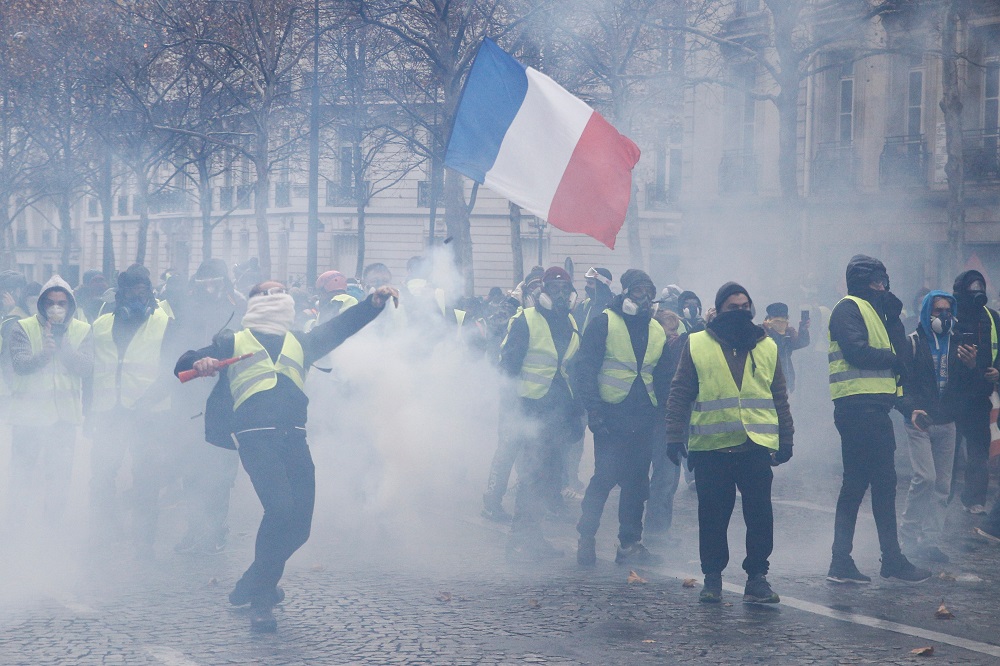Editor’s Note: In today’s column, Alex mentions ETF Strategist Nicholas Vardy’s knack for finding ways to make money in any market, anywhere in the world.
That’s some pretty high praise, especially coming from the guy who thought to get in on Netflix before it went big.
If Alex is saying Nicholas is the best at knowing when and where to go long and short… it must be true.
And you can get in on Nicholas’ great recommendations too with his new trading service, Oxford Wealth Accelerator.
More information will be coming your way THIS MONDAY.
And stay tuned for our teaser in Sunday’s Liberty Through Wealth Week in Review… it’s not one to miss!
– Katherine Koman, Assistant Managing Editor
Saturday night I had dinner with a top executive of one of France’s biggest public companies, with annual sales of more than $41 billion.
Since his office is in Paris, I asked him about the “yellow vest” protests going on outside his window.
“It’s a mess,” he said, shaking his head.
His firm is about to lay off 1,000 employees and was trying to decide whether it would be better to announce it now with all the craziness in the streets or later when the reaction might be less volatile.
“Either way,” he said, “we’re done hiring French employees. We would never say this publicly, but it’s just too expensive and restrictive. We’re going to do all our hiring elsewhere.”
And there you have in a nutshell what is wrong with the French economy. It is not business-friendly.
Worse, the country is becoming ungovernable.
France badly needs market reforms to become more competitive, but workers simply won’t stand for them.
They prefer the coddled security of socialism… Union wages. Short hours. Long vacations. Fat pensions. Early retirement.
It’s natural for workers to want these things, of course. But in the real world, the customer is king… not the employee.
France is a difficult place to do business, with high taxes, severe regulations and an oppressive government bureaucracy.
In our age of globalization, why would any multinational firm choose to set up shop in France?
The question answers itself. Few do.
That helps explain why French unemployment has hovered around 10% for over a decade now.
Of course, France provides its citizens with generous social services, including a health system that is largely free. (“Free,” at least, in that its citizens don’t pay for it directly.)
But the top marginal income tax rate in France is 45%. And, believe it or not, that’s historically low.
The personal income tax rate averaged 51.9% from 1995 through 2017, according to Trading Economics.
Income taxes are just the beginning, however. There are also high social-insurance, payroll and property taxes.
Last week the Organization for Economic Cooperation and Development (OECD) released its annual “Revenue Statistics” report and France finished at No. 1, with a tax rate equal to 46.2% of GDP, compared with the OECD average of 34.2%.
On top of this, Europe adds a regressive value-added tax that makes up 24% of revenue. (It’s also a reason EU countries aren’t considered top shopping destinations.)
And let’s not forget those gas taxes.
The “yellow vest” protests started with a $0.12 increase. That may not sound like much, but a gallon of gas already costs French drivers roughly $6, more than twice as much as Americans pay. And nearly two-thirds of that is tax.
The increase was supposed to discourage the use of fossil fuels and reduce the threat of climate change. But rural citizens have few alternatives and are livid, in part, because France is responsible for only a tiny fraction of global emissions.
It was a misstep for President Macron, who is now accused of being the president “for the rich.”
Why?
In a play to attract and keep wealthy investors and entrepreneurs, he slashed France’s famously steep wealth tax and introduced a flat tax on capital gains.
His labor restructuring made it easier for companies to hire and fire employees, although businesspeople tell me that termination still involves an extended negotiation with workers’ attorneys.
But as a result of the protests, President Macron considered reinstating the wealth tax.
Hmm. A government that makes “the mob” happy… That sounds less than perfect.
Today the French middle class is suffering. French entrepreneurs are leaving. French companies aren’t hiring. And the overwhelming majority of international companies have no desire to relocate there.
As France faces no good options, I turned to my good friend and Oxford Club ETF Strategist Nicholas Vardy to consider the best way to short the French market.
Nicholas – who is based in London and understands more than anyone I know about how to bet for or against international markets – told me it wouldn’t be easy in this case.
There are no inverse France ETFs available in this country.
My broker – E-Trade – said the Franklin FTSE France ETF (NYSE: FLFR) cannot be shorted.
The iShares MSCI France ETF (NYSE: EWQ) can be. However, E-Trade warned that it is difficult to borrow shares. Down the road I could be hit with a forced buy-in, the last thing a short seller wants to hear.
Nicholas suggested in this case my best option might be shorting some of the French ADRs (American depositary receipts). Here is a list of them, if you’re interested.
I told Nicholas – who always has great ideas about what to go long and short – to keep me posted on new developments.
In the meantime, let’s hope France is not a preview of what the U.S. will look like 10 or 20 years from now, with high taxes, angry workers, disgruntled employers… and a stock market that is 20% lower than it was 11 years ago.
Good investing,
Alex
